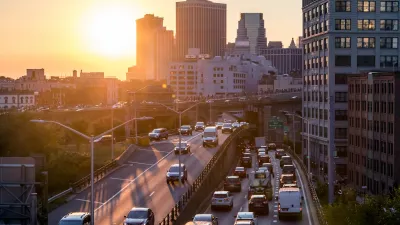In the first of two guest posts, UCLA researcher Eric A. Morris blogs on the logic behind congestion pricing.
"To many people, [congestion pricing] sounds like a scheme by mustache-twirling bureaucrats and their academic apologists to fleece drivers out of their hard-earned cash. Why should drivers have to pay to use roads their tax dollars have already paid for? Won't the remaining free roads be swamped as drivers are forced off the tolled roads? Won't the working-class and poor be the victims here, as the tolled routes turn into 'Lexus lanes'?"
"[Under the current system,] there's no free lunch; instead of paying with money, you pay with the effort and time needed to acquire the good. Think of Soviet shoppers spending their lives in endless queues to purchase artificially low-priced but exceedingly scarce goods. Then think of Americans who can fulfill nearly any consumerist fantasy quickly but at a monetary cost. Free but congested roads have left us shivering on the streets of Moscow."
"Using tolls to help internalize the congestion externality would somewhat reduce the number of trips made on the most congested roads at the peak usage periods; some trips would be moved to less congested times and routes, and others would be foregone entirely. This way we would cut down on the congestion costs we impose on each other."
Thanks to Franny Ritchie
FULL STORY: Why You’ll Love Paying for Roads That Used to Be Free: A Guest Post

Maui's Vacation Rental Debate Turns Ugly
Verbal attacks, misinformation campaigns and fistfights plague a high-stakes debate to convert thousands of vacation rentals into long-term housing.

Planetizen Federal Action Tracker
A weekly monitor of how Trump’s orders and actions are impacting planners and planning in America.

San Francisco Suspends Traffic Calming Amidst Record Deaths
Citing “a challenging fiscal landscape,” the city will cease the program on the heels of 42 traffic deaths, including 24 pedestrians.

Defunct Pittsburgh Power Plant to Become Residential Tower
A decommissioned steam heat plant will be redeveloped into almost 100 affordable housing units.

Trump Prompts Restructuring of Transportation Research Board in “Unprecedented Overreach”
The TRB has eliminated more than half of its committees including those focused on climate, equity, and cities.

Amtrak Rolls Out New Orleans to Alabama “Mardi Gras” Train
The new service will operate morning and evening departures between Mobile and New Orleans.
Urban Design for Planners 1: Software Tools
This six-course series explores essential urban design concepts using open source software and equips planners with the tools they need to participate fully in the urban design process.
Planning for Universal Design
Learn the tools for implementing Universal Design in planning regulations.
Heyer Gruel & Associates PA
JM Goldson LLC
Custer County Colorado
City of Camden Redevelopment Agency
City of Astoria
Transportation Research & Education Center (TREC) at Portland State University
Jefferson Parish Government
Camden Redevelopment Agency
City of Claremont





























